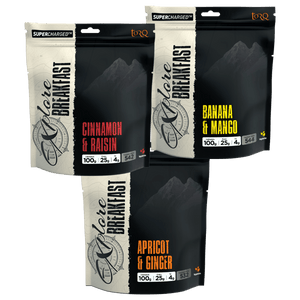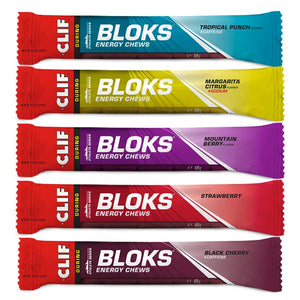It’s your choice - with our knowledge.

Product Insights
Discover more about the products in this article

Explore Breakfast
Featured Products
Nutrition Guide - Trail Running
The key to getting your nutrition spot on for any race is always to have a tried and tested plan. Everyone's nutrition needs will be different even within the same discipline, which is why it’s so important to figure out what works for you and your body, ideally before the big day.
Many people when starting out can feel overwhelmed by the choice of products on the market, and understandably so. With more options and information than ever before it can be difficult to choose your nutrition.
Our Nutrition Calculator can help you choose the nutrition you need for a trail run.
Lets take a look at what trail running is, and how you can fuel for your best performance.

What is trail running?
Trail Running is considered a mixture of running and hiking on any unpaved, natural, surface, and can be done just about anywhere making it increasingly popular amongst new runners.
Terrain can vary massively from trail to trail making it hard to compare any two races. For this reason, trail running is less focused on speed and finish time than road running. For many people it’s more about the challenge and a chance to be out in nature.
Trail running can be more demanding on certain joints and muscles and requires specific nutrition just like any other discipline. Also, just like the others this can be easily broken down into three main categories - pre, during, & post.
Pre
One of the most important things to remember for a successful nutrition strategy is don’t leave it too late!
You’ll want to start off strong so skipping breakfast isn’t an option.
It’s best to eat 2 to 3 hours ahead of a run, this will give your body plenty of time to digest your meal. Ideally, any meal eaten pre-run should be high in carbohydrates and protein and avoid too many fats or fibre which can leave you feeling full and uncomfortable.
You might try granola with berries, some porridge with dried fruit, a banana or TORQ's Explore Breakfast.
Often an energy drink can be the ideal next step in your nutrition plan. You will get the most benefit from this if you drink it early, so somewhere between breakfast and around 45 minutes before the race is perfect.
The reason for this being that the slower you can consume your fuel the longer the body has to absorb it to maximise your performance. An energy drink will give you a boost of carbs to help your body top up the muscle's glycogen levels, also containing electrolytes to keep you hydrated.
However, when choosing an energy drink as your pre-race fuel it’s important to consider how much liquid you’re consuming, you don’t want to start out feeling bloated and also remember you’re going to be out on the trail for a considerable amount of time. If you don’t think an energy drink is the right thing for you before a run or race then an energy gel around 15-20 minutes before can be a good alternative.
Whichever option you choose, the two most important things are your hydration levels and glycogen stores.

During
Your nutrition needs for trail running will be time and distance dependant.
If you’re only going for a short run then you might not require any extra nutrition during.
Generally, if you’re running or racing for an hour or more (which you usually will be) then you’ll benefit from in race fuelling.
While you’re out on the trail you’ll want to keep your energy and hydration levels up to maintain a consistent performance. There are a few different ways to do this and everyone will have their own preferences but the main forms of nutrition for in race fuelling tend to be: energy drinks, chews, and gels.
Some people might decide to skip the energy drink at the beginning instead choosing to drink it during their run. This is a great option for an energy and hydration boost and is great for trail running when you’re able to carry soft flasks in a running vest.
If choosing an energy drink, you may also like to pair it with a solid fuel source like an energy bar. However, it's important to choose foods you can easily digest and fairly quickly because the stomach has a harder time with digestion during physical activity. When choosing an energy bar it can be beneficial to go for something with a high protein content to reduce damage to muscle fibres.
If the drink and bar combo isn’t for you then you can also opt for an energy gel which are ideally consumed every 30-45 minutes.
Or, last but not least, if you can’t tolerate gels then energy chews such as the Clif Shot Bloks are a great alternative, just replace one gel with 3 chews.
Using a caffeinated drink or gel can be a good idea during a trail run to help you maintain focus, really important when running on uneven and possibly unfamiliar terrain.

Post
Once again, your recovery nutrition strategy is something that’s best not left too late and is just as important as your pre-race so don’t think you can skip it!
The key things to focus on post-race are: replenishing your electrolytes (rehydrate), restoring glycogen levels, rebuilding your immune defences, and repairing muscle tears.
The best way to kick this off is to grab a recovery drink within 20 minutes of finishing your run, these contain a great mix of carbs, protein and electrolytes all of which will aid your recovery.
- Carbohydrates: To replace glycogen lost from the muscles during exercise, reduce muscle soreness and fight immunodepression.
- Protein: Promotes growth to rebuild muscles- trail running puts a lot of strain on the body and can cause a lot of muscle tears.
- Electrolytes: For hydration!
But remember, just like pre-race, it’s best to savour this drink to maximise its benefits - no matter how good it tastes!
As well as a recovery drink you’ll also want to eat some actual food after your run. This can really be anything that is high in carbs and protein for their restorative properties, and includes fruits or vegetables high in vitamins and minerals for an immune boost, this could be a recovery bar!
Once you’ve got your trail running nutrition plan down then all that’s left to do is enjoy yourself. Trail running is a great way to spend time out in nature whilst also getting a great workout and with a current estimate of 20 million trail runners worldwide, the sport is growing in popularity every year.
Need Assistance?
If you are still not sure what products you should use, why not send us a message using our 'Ask the Team' service and we will respond to your request within 24 hours.
It’s your choice - with our knowledge.










































































































